
Guests
- Ayana Elizabeth Johnsonmarine biologist and co-founder of the Urban Ocean Lab.
- Katharine Wilkinsonauthor, strategist and visiting professor at Sewanee: The University of the South in Tennessee.
As the impacts of the climate emergency continue to be felt around the globe, white men overwhelmingly dominate the airwaves on climate coverage. We speak with co-editors of the new book “All We Can Save,” an anthology of essays by 60 women at the forefront of the climate justice movement. “We are simply not seeing very much climate coverage at all in the mainstream media,” says Ayana Elizabeth Johnson, a marine biologist and co-founder of the Urban Ocean Lab. Katharine Wilkinson, visiting professor at Sewanee: The University of the South in Tennessee, emphasizes women and girls around the world are “disproportionately impacted by climate change” and must lead the search for solutions. “There is a growing body of research that centering women’s leadership on climate is not just something that sounds nice. It’s actually a critical strategy for how we win,” Wilkinson says.
Transcript
AMY GOODMAN: This is Democracy Now!, democracynow.org, The War and Peace Report. I’m Amy Goodman, with Nermeen Shaikh.
An analysis by Media Matters found Jeff Bezos’ rocket trip to the edge of space for 10 minutes got nearly as much coverage in one day as climate change did for an entire year. NBC, ABC and CBS morning shows spent 212 minutes covering the short trip on Tuesday and spent 267 minutes covering the climate crisis all of 2020. Media Matters has also found white men overwhelmingly dominated the airwaves on climate coverage for at least the fourth year in a row.
This comes as the impact of the climate crisis continues to be felt around the globe. Dozens are dead in China’s Henan province after it was battered with a year’s worth of rain in just three days. Hundreds of thousands had to be evacuated. In Siberia, more than 300,000 residents were told to stay indoors amid record-breaking wildfires. Here in the U.S., the skies are once again thick with haze as far east as New York City, where we are, as the massive Bootleg Fire in Oregon and other fires rage in the West, burning an area larger than Los Angeles. This comes as a new report found the California wildfires could contain dangerous levels of toxic metals, including lead. Meanwhile, the Great Salt Lake, the largest saltwater lake in the Western Hemisphere, has tied its all-time historic lowest level, is expected to break that record soon amidst the ongoing drought. This all comes as deadly floods swept through western Germany and parts of Belgium last week.
Well, we spend the rest of the hour with the co-editors of the book All We Can Save, just out in paperback this week. It’s an anthology of essays by 60 women at the forefront of the climate movement. Dr. Ayana Elizabeth Johnson is a marine biologist and co-founder of the Urban Ocean Lab. And Dr. Katharine Wilkinson is an author and visiting professor at Sewanee: The University of the South in Tennessee. They’re co-founders of the All We Can Save Project.
We welcome you to Democracy Now! Dr. Ayana Johnson, let’s begin with you. If you can look at the globe for us, I mean, if we took that view from space of the globe, from the massive fires in the west of the United States to the massive flooding in China that we’re seeing right now, the drought of the Great Salt Lake, put this together for us, why we should care, and what people are doing about it right now.
AYANA ELIZABETH JOHNSON: I mean, we should care because this is the planet that we have to live on, right? Like, we can’t actually all leave the planet. And it is interesting that you opened this segment by talking about the balance of coverage. We are simply not seeing very much climate coverage at all in the mainstream media. What we see is last year about 0.4% of the major news shows’ minutes were about climate, 0.4%. So we’re not talking about what we’re supposed to do. And only 30% of the coverage that does exist on climate in major news outlets talks about solutions. So we’re just not having the deep conversations about what we do next.
So, Katharine and I decided to put together this anthology to bring a whole new cadre of climate leaders to the fore, to expand the number of voices people were looking to in times of crisis, to share the wisdom from women climate leaders, and to have this focus on solutions, as the subtitle reflects, that this is about truth, courage and solutions, not like doom, gloom and give up, but really thinking about what’s next for the climate movement and the need for it to be a very leaderful movement if we’re going to succeed.
NERMEEN SHAIKH: Dr. Ayana Elizabeth Johnson, you, of course, focus on oceans in your own work. Could you talk about the specific impact on oceans and ocean life from climate change? You’ve said when — you know, people talk about the Amazon and rainforests as being the lungs of the world. You say that oceans are, as well. Could you explain?
AYANA ELIZABETH JOHNSON: Yeah. The ocean produces about half of the oxygen we breathe. It has also already absorbed about a third of the carbon dioxide that we have emitted by burning fossil fuels, which has turned the ocean more acidic than it has been in human history. So we have an increasingly acidic ocean, an increasingly warmer ocean. That’s very bad for the creatures that are trying to live in there. Some are trying to flee towards the poles, when they can move, like fish. Others, like corals, are often now frying in place. So we have just a very different ocean than we had even a hundred years ago.
But at the same time, the ocean can be a place we can look for climate solutions. And that’s been something that’s been missed to date. We know that wetlands, mangroves, seagrasses, these coastal ecosystems, can absorb maybe four or five times more carbon in their soils per hectare than a forest on land. So, we think a lot about trees. We don’t think enough about mangroves and seagrasses and marshes. There’s also an opportunity for regenerative farming in the ocean, of seaweed and shellfish, as a way to feed people very sustainably, provide jobs, and the same for offshore renewable energy as another really important way the ocean can be part of our climate solutions.
So, when I and other ocean policy folks looked at the Green New Deal, we realized the ocean and all the solutions it’s trying to offer us for how to address the climate crisis were essentially left out. So, when I’m not working on All We Can Save and the nonprofit with Katharine, I work as co-founder of Urban Ocean Lab, thinking about how to make sure we’re including the ocean when it comes to climate policy, and shepherding this concept of the Blue New Deal that we need in complement to the green one.
AMY GOODMAN: And can you talk about the recent heat dome in the west of the United States and Canada, that led to over 1 billion marine animals dying?
AYANA ELIZABETH JOHNSON: Yeah. I mean, I think we’re seeing now what scientists have long predicted, that there would be these extreme impacts of climate. And it’s just that they’re all happening so quickly and at once, and the media is covering them in a new way. It’s not that these extreme events are completely unprecedented. We’re also seeing the predicted salmon die-offs and other things. So, this is a chickens-coming-home-to-roost moment. And I’m seeing a lot of my friends who — sort of aware, of course, that climate change is happening, but hasn’t really, like, hit them — we’re seeing people wake up right now.
And this book, All We Can Save, is — each of these essays is really a door into what people can do to be a part of climate solutions. Whether you’re a farmer or a lawyer or an activist or an artist or a journalist or a teacher, there are so many ways that people can use whatever skills they have to contribute to climate solutions. So, we would hope, of course, that extreme weather wouldn’t be what’s required to wake people up, but, hopefully, we’re getting that wake-up call now in a way that will really motivate people to change our relationship with nature and to change policy in a major way.
AMY GOODMAN: In northern Minnesota, authorities arrested Native American leader, environmentalist, activist Winona LaDuke and at least six other water protectors Monday during a protest at the Shell River against the Enbridge Line 3 tar sands pipeline. Last month, we spoke to Winona about the ongoing resistance to the pipeline.
WINONA LADUKE: Line 3 is the line that we’ve been fighting. It’s a brand-new corridor. You know, it’s a brand-new corridor through our prime territory of wild rice, our clam beds, our fish, all of our territory. And we’ve stood and tried every process to stop this. I’m someone, along with all of these other women water protectors and our tribes, we spent seven years in the regulatory process. And now what we see is even Joe Biden sends in a helicopter to go and start hurting our people. You know, our people have had very little recourse. We have none. You know? And so, now we’ve come to go stand, and thousands of people have come to join us.
AMY GOODMAN: Winona LaDuke and others are calling on President Biden to shut down the pipeline. This is Indigenous leader and lawyer Tara Houska speaking earlier this summer.
TARA HOUSKA: We have to stand together. There are no sacrifice zones. There are no sacrifice people. All of our lives, all of our land, all of our water. … And yet, here again, we see some of the most vulnerable people of this place who are on the frontlines — Black, Brown, Indigenous, young, queer — all these people who are typically unrepresented, in those decision-making places. Yet here we are, and here are all of our accomplices together.
AMY GOODMAN: That’s Indigenous leader and lawyer Tara Houska, speaking at the protests in northern Minnesota. You can go to democracynow.org to see our interviews both with Tara and with Winona LaDuke. I want to bring in Dr. Katharine Wilkinson, co-editor of this volume, All We Can Save anthology. Katharine, Tara is one of the contributors to this volume. Talk about the significance of the Indigenous leadership and contribution to solutions to the climate crisis.
KATHARINE WILKINSON: Tara has a absolutely stunning essay in the collection called “Sacred Resistance,” and she talks about this work on the frontlines of stopping additional fossil fuel infrastructure. And, of course, Indigenous women and Indigenous leaders of all genders are leading incredibly important land defense and resistance work around the world. And it’s absolutely vital work, because we know we have a whole toolbox of solutions that we can move forward, through things like a clean electricity standard, but at the same time we have to be slamming the brakes on the fossil fuel economy’s insistence on continuing to propel itself forward.
And Tara also talks about, in that essay, the fundamental values shift that really sits beneath all of this work, about coming back into balance with the living systems of our planet, a position of reciprocity rather than extraction, take, make, waste, profit, and actually really reclaiming the sort of rightful role that humans can have in relationship with this Earth — as she calls it, our mother.
NERMEEN SHAIKH: And, Dr. Wilkinson, could you elaborate on what you see the climate change impacts being on women, why women are especially impacted, and poor women especially, in this country but also around the world, in the Global South?
KATHARINE WILKINSON: I think the easiest way to think about it is that anywhere we have existing injustices or inequities in our society, as climate change increases, as the planet gets hotter, it essentially turns up the dial on all of those things. So, as we face greater risks, greater issues around needing to cope with access to water, food production, migration, all of these things are more difficult if you are already starting sort of on the back foot, so to speak, in society. And, of course, gender is one of those lines of inequity and imbalance around the world. And so, just as you’ve said, women and girls are disproportionately impacted by climate change.
But it’s not just a story of victimhood, right? We also need women and girls to be at the center of shaping solutions. And when we scan the landscape of critical climate decision-making spaces, from business to government and beyond, in virtually every single one of them, women are underrepresented. And that’s not just an issue of fairness. It’s actually an issue of whether or not we can successfully secure a just and livable future. There is a growing body of research that’s centering women’s leadership on climate. It’s not just something that sounds nice. It’s actually a critical strategy for how we win.
AMY GOODMAN: I wanted to ask Ayana Johnson — last month, climate justice advocates led a series of actions in Washington, D.C., demanding President Biden and Congress take meaningful action on the climate crisis. Over 500 groups signed a letter to the Democratic leadership calling for an end to fossil fuel subsidies in any infrastructure or economic recovery bills. This is Ebony Martin of Greenpeace USA.
EBONY MARTIN: The time is now for Biden to change. The time is now for us to shift and call for an elimination of fossil fuel subsidies. So, I want you to get on the phone. I want you to call all day every day. Get on their nerves. Let them know they work for us.
AMY GOODMAN: And this is Alexandria Ocasio-Cortez, congressmember of New York, one of the leaders — leading proponents of the Green New Deal.
REP. ALEXANDRIA OCASIO-CORTEZ: What a lot of folks here in D.C. don’t understand is that while this may be the hottest summer of their lives, it’s going to be one of the coolest summers of our lives. And so what that means is that they brought this heat on us, so we bring the heat on them.
AMY GOODMAN: So, Ayana, right now we are seeing a bipartisan infrastructure bill that is struggling its way through Congress, that’s already been stripped of so much of dealing with the Green New Deal, as the West is on fire, the East is breathing it in, the drought in the middle. Can you relate that to who we see on television when dealing with the climate crisis? According to Media Matters, “How broadcast TV networks covered climate change in 2020,” say only six women of color appeared as guests to discuss climate change, compared to 10 in 2019. So the number is going down. Do you see a relationship between dealing with the climate crisis and who we get to see proposing solutions, people like you?
AYANA ELIZABETH JOHNSON: I think what we’re seeing —
AMY GOODMAN: I think your mic is muted, Ayana. I think your mic is muted.
AYANA ELIZABETH JOHNSON: I think —
AMY GOODMAN: Here it is.
AYANA ELIZABETH JOHNSON: Can you hear me now?
AMY GOODMAN: Go ahead. If you could repeat what you were saying?
AYANA ELIZABETH JOHNSON: I think what we’re seeing is that we simply do not have the leaders that we need. That is why we are in the mess that we are in. As you mentioned, it is only 20% of people speaking about climate in the media are women. Only 8% of people are color. This is — are people of color. This is across mainstream news, when it’s even covering climate at all. And the climate crisis, this need to transition from a fossil fuel-based economy to a regenerative economy, this is going to require a shift in all sectors, right? This is not —
AMY GOODMAN: And that is the way we’re going to end today. We thank you so much, Dr. Ayana Elizabeth Johnson and Katharine Wilkinson. I’m Amy Goodman, with Nermeen Shaikh.

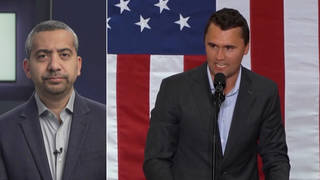
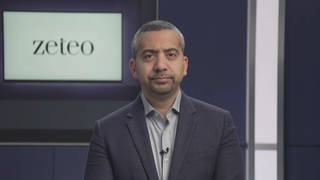
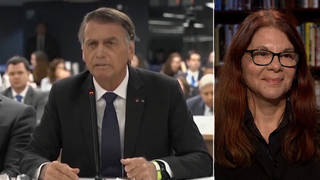
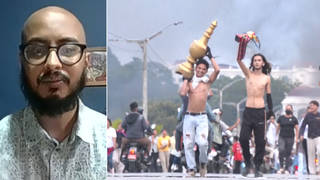





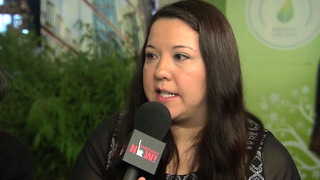
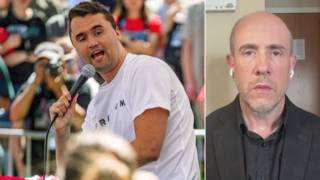
Media Options